- Back to Home »
- Traffic scandal may have legal fallout
- New Jersey state assembly releases 907 pages of documents Friday on lane closure scandal
- Christie's Republican political allies may have created traffic mayhem to spite a Democrat
- A group of citizens has filed a class action lawsuit against Christie
- Analyst: There may have been a crime, as woman died during the chaos
(CNN) -- This may turn into much more than just a political scandal.
It may have seemed like a teenage prank at the time, but the blockage of bridge traffic as a possible act of partisan political revenge has put New Jersey Gov. Chris Christie in the middle of a serious legal stew.
And the fire underneath it is just beginning to heat up for the Republican presidential hopeful, as the state assembly plans to post online 907 pages of documents related to the case Friday.
State lawmakers questioned one of Christie's allies on Thursday, a former state official implicated in the scandal. So far, David Wildstein has repeatedly refused to answer, invoking his Fifth Amendment right against self-incrimination.
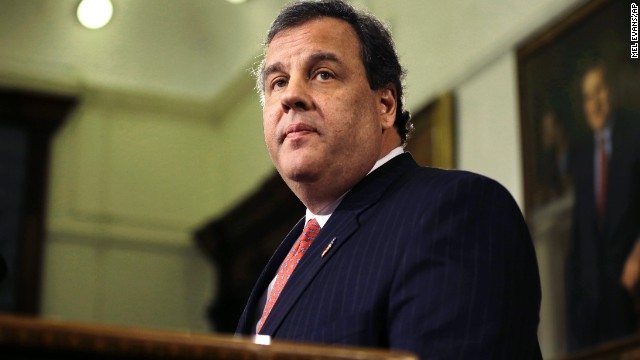 New Jersey Gov. Chris Christie is embroiled in the controversy over what appears to be political payback from his last gubernatorial campaign. Christie hasn't been tied to the scandal, but aides and appointees have been accused of closing lanes on the George Washington Bridge to punish the mayor of Fort Lee, who didn't endorse Christie.
New Jersey Gov. Chris Christie is embroiled in the controversy over what appears to be political payback from his last gubernatorial campaign. Christie hasn't been tied to the scandal, but aides and appointees have been accused of closing lanes on the George Washington Bridge to punish the mayor of Fort Lee, who didn't endorse Christie. 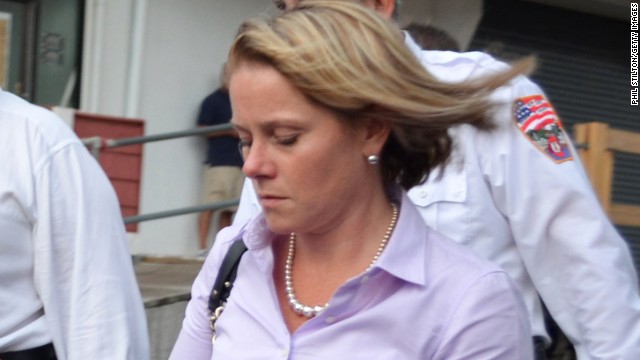 Christie fired Bridget Anne Kelly, who had been his deputy chief of staff, when her e-mail ordering the lane closings emerged. In his news conference on Thursday, Christie said he was "embarrassed and humiliated" by the "abject stupidity" of the move.
Christie fired Bridget Anne Kelly, who had been his deputy chief of staff, when her e-mail ordering the lane closings emerged. In his news conference on Thursday, Christie said he was "embarrassed and humiliated" by the "abject stupidity" of the move. 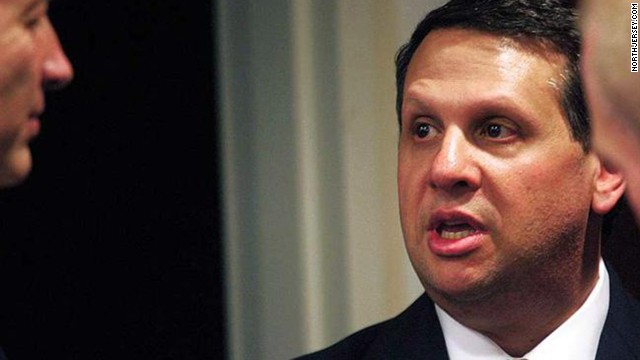 David Wildstein, who apparently carried out Bridget Kelly's orders, is under investigation by a state Assembly committee looking into the scandal. The committee charged Wildstein with contempt for failing to answer its questions. Wildstein resigned from his top-level position with the Port Authority of New York and New Jersey in December.
David Wildstein, who apparently carried out Bridget Kelly's orders, is under investigation by a state Assembly committee looking into the scandal. The committee charged Wildstein with contempt for failing to answer its questions. Wildstein resigned from his top-level position with the Port Authority of New York and New Jersey in December. 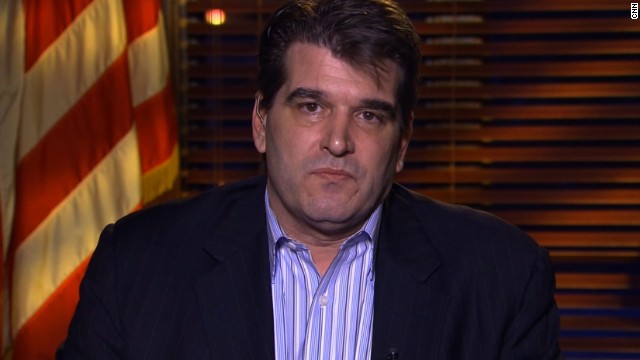 Mark Sokolich, the mayor of Fort Lee, called the lane closings a "venomous form of political retaliation." After a face-to-face meeting with Christie following his news conference, Sokolich said the governor was "gracious and apologetic" but said that "we're concerned there is more stuff and more issues to deal with."
Mark Sokolich, the mayor of Fort Lee, called the lane closings a "venomous form of political retaliation." After a face-to-face meeting with Christie following his news conference, Sokolich said the governor was "gracious and apologetic" but said that "we're concerned there is more stuff and more issues to deal with." 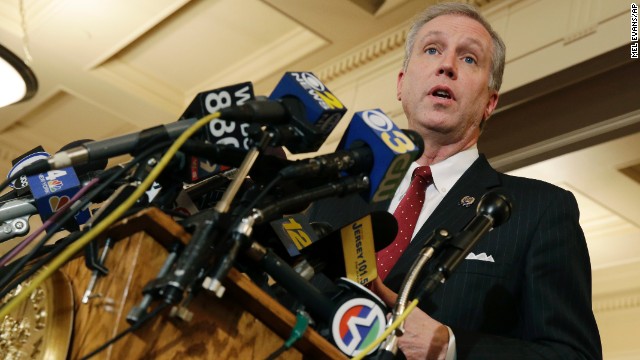 New Jersey Democratic Assemblyman John Wisniewski chairs the Transportation Committee that is investigating the scandal. Wisniewski says Christie "has a lot of explaining to do."
New Jersey Democratic Assemblyman John Wisniewski chairs the Transportation Committee that is investigating the scandal. Wisniewski says Christie "has a lot of explaining to do." 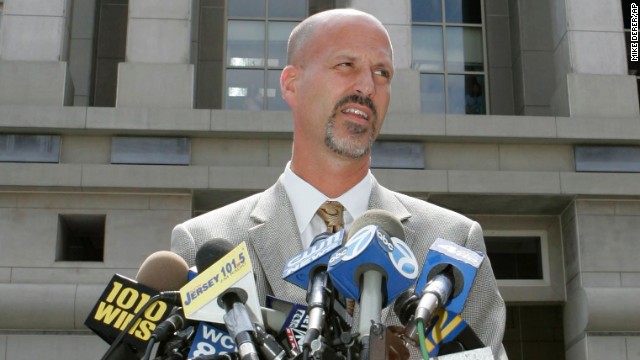 Michael Drewniak, Christie's spokesman, told reporters early in the investigation: "The governor of the state of New Jersey does not involve himself in traffic studies," which is what David Wildstein had said the lane closings were for.
Michael Drewniak, Christie's spokesman, told reporters early in the investigation: "The governor of the state of New Jersey does not involve himself in traffic studies," which is what David Wildstein had said the lane closings were for. 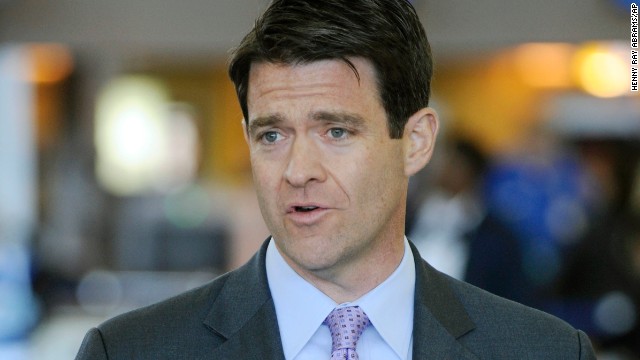 Bill Baroni was executive deputy director of the Port Authority until he resigned amid the scandal in December. Christie said that Baroni accepted responsibility for not following the right protocols in approving the traffic study initially blamed by the administration for the lane closures.
Bill Baroni was executive deputy director of the Port Authority until he resigned amid the scandal in December. Christie said that Baroni accepted responsibility for not following the right protocols in approving the traffic study initially blamed by the administration for the lane closures. 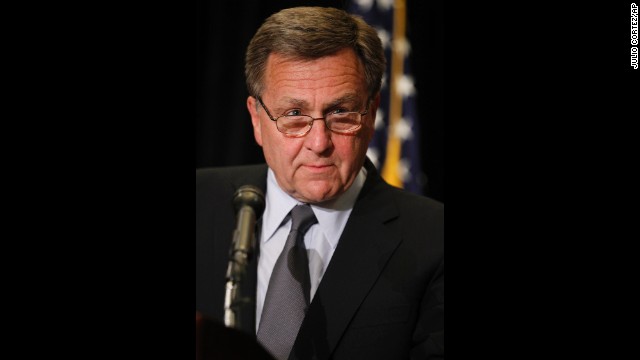 David Samson, Port Authority chairman, said the PA's board had no knowledge of the lane closings until they were lifted five days later. "I am extremely upset and distressed over today's disclosures," Samson, a Christie appointee, said in a statement after learning of the closings.
David Samson, Port Authority chairman, said the PA's board had no knowledge of the lane closings until they were lifted five days later. "I am extremely upset and distressed over today's disclosures," Samson, a Christie appointee, said in a statement after learning of the closings. 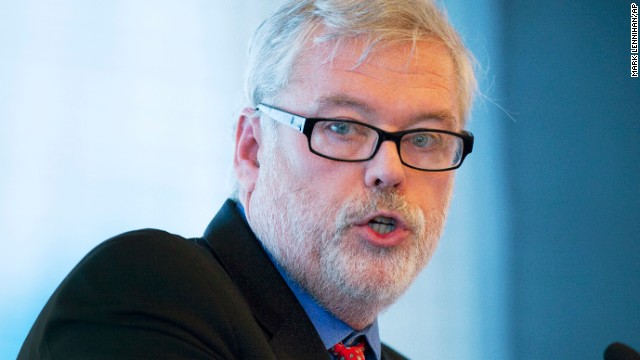 Patrick Foye, the executive director of the Port Authority of New York and New Jersey, said the George Washington Bridge lane closures didn't follow protocols and ordered them reopened.
Patrick Foye, the executive director of the Port Authority of New York and New Jersey, said the George Washington Bridge lane closures didn't follow protocols and ordered them reopened. 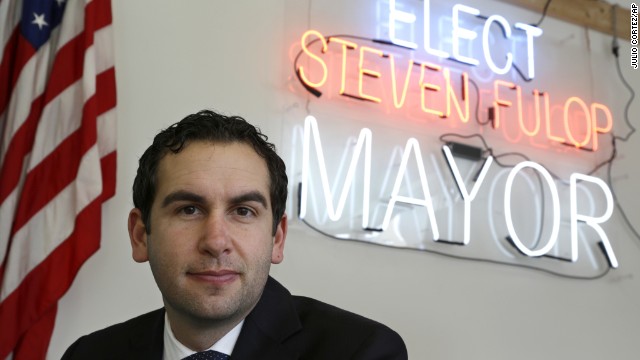 Jersey City Mayor Steven Fulop, a Democrat who also didn't endorse Chris Christie, has raised his own suspicions about his cooled relationship with the administration and a suddenly tabled bill he was sponsoring in Trenton.
Jersey City Mayor Steven Fulop, a Democrat who also didn't endorse Chris Christie, has raised his own suspicions about his cooled relationship with the administration and a suddenly tabled bill he was sponsoring in Trenton. 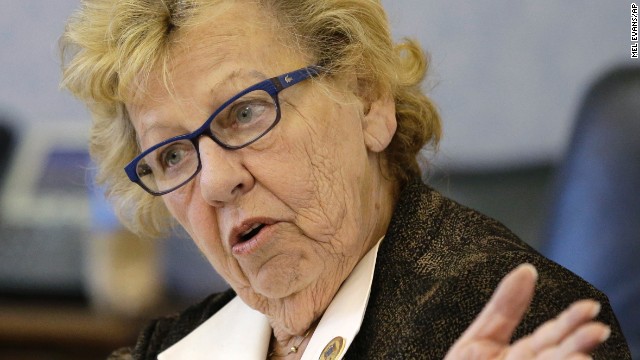 New Jersey Senate Majority Leader Loretta Weinberg, a Democrat, has been pressing for information about the scandal and has introduced a measure in the Legislature asking Congress to restructure the Port Authority of New York and New Jersey, which operates bridges and tunnels, to ensure transparency.
New Jersey Senate Majority Leader Loretta Weinberg, a Democrat, has been pressing for information about the scandal and has introduced a measure in the Legislature asking Congress to restructure the Port Authority of New York and New Jersey, which operates bridges and tunnels, to ensure transparency. 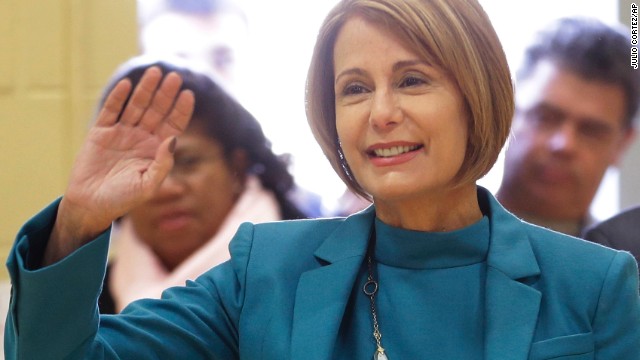 Democrat Barbara Buono is a New Jersey state Senator who challenged Chris Christie this past November. She derided him during the campaign as representing "the worst combination of bully and bossism" and brought up the lane closures as an example. She lost in a landslide.
Democrat Barbara Buono is a New Jersey state Senator who challenged Chris Christie this past November. She derided him during the campaign as representing "the worst combination of bully and bossism" and brought up the lane closures as an example. She lost in a landslide. 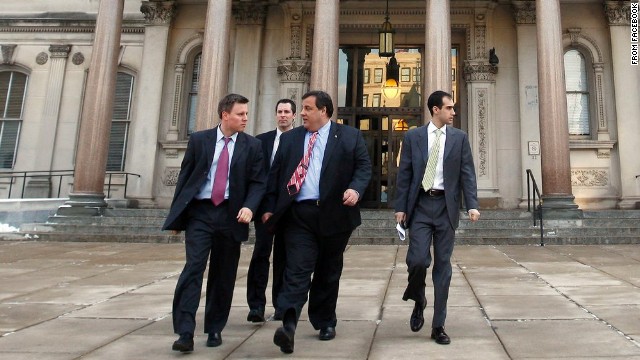 Bill Stepien is a sharp-elbowed strategist who managed Chris Christie's two gubernatorial campaigns. The notorious e-mails suggested he was aware of the Fort Lee bridge lane closures, and Christie has asked him to give up his political role.
Bill Stepien is a sharp-elbowed strategist who managed Chris Christie's two gubernatorial campaigns. The notorious e-mails suggested he was aware of the Fort Lee bridge lane closures, and Christie has asked him to give up his political role. 
1

2

3

4

5

6

7

8

9

10

11

12

13
 Who's who in Christie bridge scandal
Who's who in Christie bridge scandal 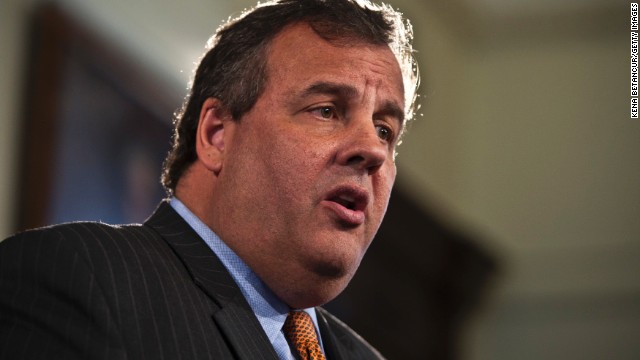 Scandal is unfolding around New Jersey Gov. Chris Christie over lane closures on the George Washington Bridge as part of a political vendetta to punish a local mayor who wouldn't support him at the polls. In damaging evidence, Christie's top aide, Bridget Anne Kelly, sent an e-mail to David Wildstein, then-top New Jersey official at the Port Authority, three weeks before the lane closures, saying, "Time for some traffic problems in Fort Lee." "Got it," Wildstein replied. New Jersey State Sen. Ray Lesniak told CNN he will formally request an investigation.
Scandal is unfolding around New Jersey Gov. Chris Christie over lane closures on the George Washington Bridge as part of a political vendetta to punish a local mayor who wouldn't support him at the polls. In damaging evidence, Christie's top aide, Bridget Anne Kelly, sent an e-mail to David Wildstein, then-top New Jersey official at the Port Authority, three weeks before the lane closures, saying, "Time for some traffic problems in Fort Lee." "Got it," Wildstein replied. New Jersey State Sen. Ray Lesniak told CNN he will formally request an investigation. 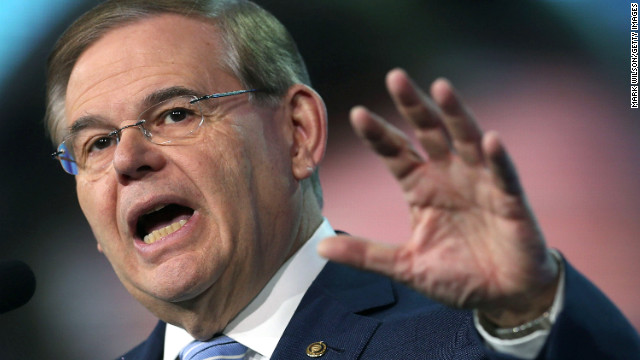 Sen. Robert Menendez is saying accusations of paying a Dominican woman for sex against him are part of a smear campaign against him after a woman filed a notarized statement that she had never even met the New York Democrat. If Menendez's charges are true, it wouldn't be the first time an American politician was targeted for dirty tricks -- the practice goes back as far as running for office in the U.S. Click through to see other examples of less-than-ethical campaign tactics.
Sen. Robert Menendez is saying accusations of paying a Dominican woman for sex against him are part of a smear campaign against him after a woman filed a notarized statement that she had never even met the New York Democrat. If Menendez's charges are true, it wouldn't be the first time an American politician was targeted for dirty tricks -- the practice goes back as far as running for office in the U.S. Click through to see other examples of less-than-ethical campaign tactics. 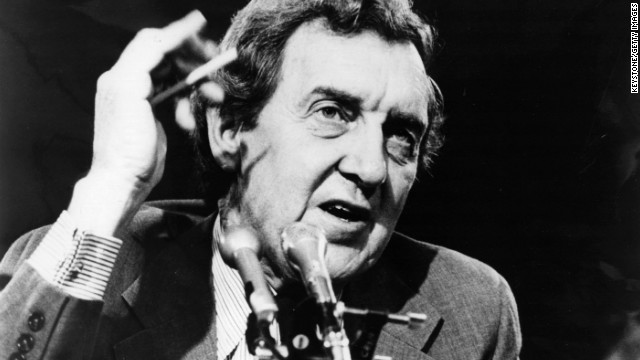 Fake letters: Then-Sen. Edmund Muskie of Maine was expected to do well in the 1972 Democratic primary in neighboring New Hampshire. But the Manchester Union-Leader published a letter alleging that Muskie condoned the use of the term "Canuck," a derogatory term used against French-Canadians. Muskie denied the charge but still suffered at the polls in the early primary, which doomed his chances. The Washington Post later reported that the letter was a hoax and was probably written by Ken Clawson, deputy White House communications director in the Nixon administration.
Fake letters: Then-Sen. Edmund Muskie of Maine was expected to do well in the 1972 Democratic primary in neighboring New Hampshire. But the Manchester Union-Leader published a letter alleging that Muskie condoned the use of the term "Canuck," a derogatory term used against French-Canadians. Muskie denied the charge but still suffered at the polls in the early primary, which doomed his chances. The Washington Post later reported that the letter was a hoax and was probably written by Ken Clawson, deputy White House communications director in the Nixon administration. 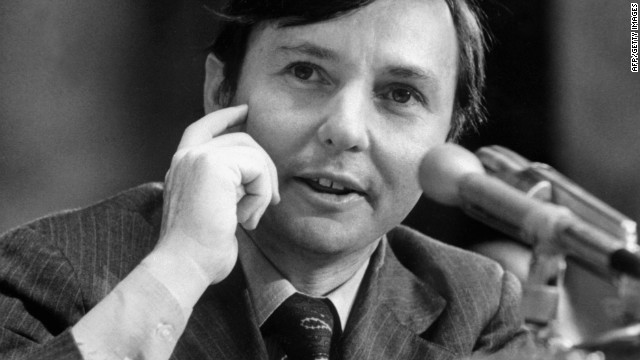 Watergate: The break-in at the Watergate was just the tip of the iceberg of what was going on within Richard Nixon's re-election campaign in 1972. The Nixon machine was hell-bent on destroying its opponents and Donald Segretti was one of the primary dirty tricksters. The Nixon operative printed fliers that attacked Muskie on his stance against Israel and placed them outside synagogues. He also pitted Democrats against one another in a tactic he called "rat-f---ing," like the letter addressed from Citizens for Muskie that accused Democratic primary rival Sen. Henry Jackson of fathering an illegitimate child with a teenager and that Jackson was a homosexual. Segretti was one of several Nixon operatives who ended up in jail.
Watergate: The break-in at the Watergate was just the tip of the iceberg of what was going on within Richard Nixon's re-election campaign in 1972. The Nixon machine was hell-bent on destroying its opponents and Donald Segretti was one of the primary dirty tricksters. The Nixon operative printed fliers that attacked Muskie on his stance against Israel and placed them outside synagogues. He also pitted Democrats against one another in a tactic he called "rat-f---ing," like the letter addressed from Citizens for Muskie that accused Democratic primary rival Sen. Henry Jackson of fathering an illegitimate child with a teenager and that Jackson was a homosexual. Segretti was one of several Nixon operatives who ended up in jail. 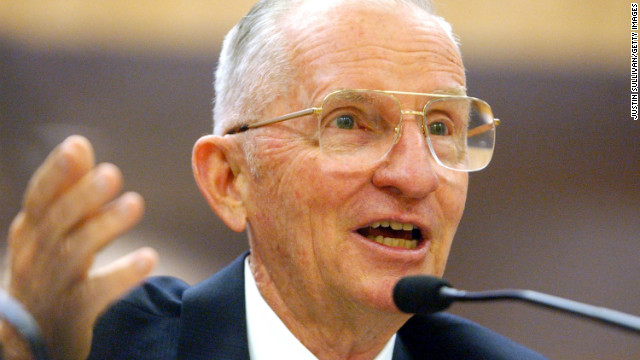 Doctored photos: Ross Perot was the first major third-person candidate in modern American politics to mount a serious run for the White House. His plain spokenness got attention and his platform appealed to the far-right. Most of all, he was seen as a threat to split the Republican vote with President George H.W. Bush, who was running for his second. Despite the energy in his campaign, Perot dropped out of the race, claiming that Republican operatives were about to smear his daughter with doctored photos and try to ruin her wedding. Perot never explained what the photograph purportedly showed.
Doctored photos: Ross Perot was the first major third-person candidate in modern American politics to mount a serious run for the White House. His plain spokenness got attention and his platform appealed to the far-right. Most of all, he was seen as a threat to split the Republican vote with President George H.W. Bush, who was running for his second. Despite the energy in his campaign, Perot dropped out of the race, claiming that Republican operatives were about to smear his daughter with doctored photos and try to ruin her wedding. Perot never explained what the photograph purportedly showed. 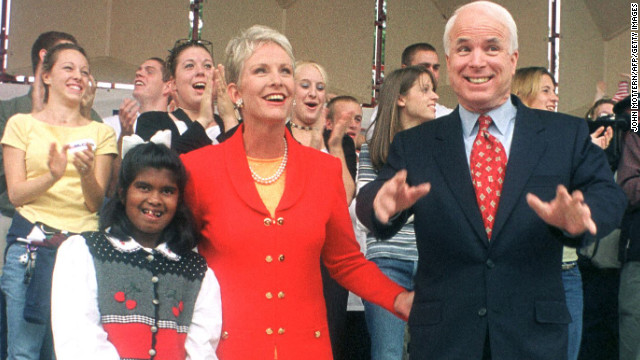 South Carolina: Sen. John McCain's first run for president was against then-Texas Gov. George W. Bush in 2000. Karl Rove, often called the "brain" behind the Bush operation, began to spread the rumor in South Carolina that McCain had fathered an illegitimate black child, asking voters if they would support McCain if he had fathered an illegitimate black child. McCain lost South Carolina decisively and his chance at the nomination. The rumors twisted the fact that McCain's adopted daughter Bridget whom he adopted from Bangladesh.
South Carolina: Sen. John McCain's first run for president was against then-Texas Gov. George W. Bush in 2000. Karl Rove, often called the "brain" behind the Bush operation, began to spread the rumor in South Carolina that McCain had fathered an illegitimate black child, asking voters if they would support McCain if he had fathered an illegitimate black child. McCain lost South Carolina decisively and his chance at the nomination. The rumors twisted the fact that McCain's adopted daughter Bridget whom he adopted from Bangladesh. 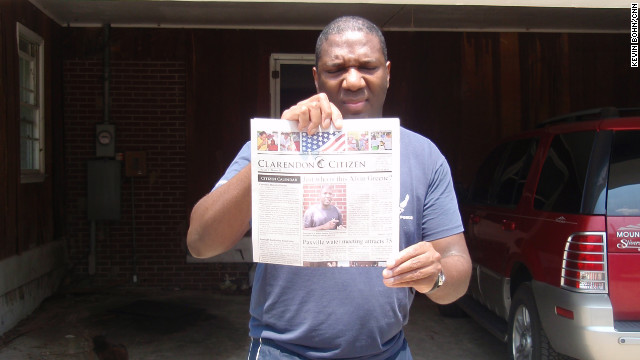 The mystery of Alvin Greene: When Alvin Greene suddenly won the Democratic primary for U.S. Senate in South Carolina, experts asked, "Who?" Greene didn't campaign, had no political experience was rarely seen in public. A CNN interview led to more questions of whether he was intellectually capable of running a viable campaign. Others felt that Green was planted by Republican Sen. Jim DeMint, who was running for re-election. Greene was cleared by the South Carolina Law Enforcement Division before he lost overwhelmingly to DeMint.
The mystery of Alvin Greene: When Alvin Greene suddenly won the Democratic primary for U.S. Senate in South Carolina, experts asked, "Who?" Greene didn't campaign, had no political experience was rarely seen in public. A CNN interview led to more questions of whether he was intellectually capable of running a viable campaign. Others felt that Green was planted by Republican Sen. Jim DeMint, who was running for re-election. Greene was cleared by the South Carolina Law Enforcement Division before he lost overwhelmingly to DeMint. 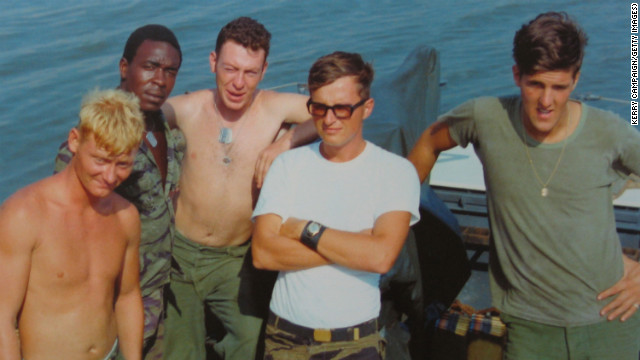 Swift-boating: Before John Kerry was elected senator, won the Purple Heart and a Bronze Star for his service in Vietnam before later protesting against the war. When he ran against Bush in 2004, he spoke out against the Iraq War. Although Kerry was seen as the underdog in the race, he was gaining momentum before a political ad released by the group known as Swift Boat Veterans for Truth accused Kerry of speaking ill of his fellow veterans and lying to get his medals. Kerry first tried to ignore the ads before denying the allegations but by then the ads and Kerry's avoiding them stopped whatever momentum was building.
Swift-boating: Before John Kerry was elected senator, won the Purple Heart and a Bronze Star for his service in Vietnam before later protesting against the war. When he ran against Bush in 2004, he spoke out against the Iraq War. Although Kerry was seen as the underdog in the race, he was gaining momentum before a political ad released by the group known as Swift Boat Veterans for Truth accused Kerry of speaking ill of his fellow veterans and lying to get his medals. Kerry first tried to ignore the ads before denying the allegations but by then the ads and Kerry's avoiding them stopped whatever momentum was building.  Political dirty tricks
Political dirty tricks 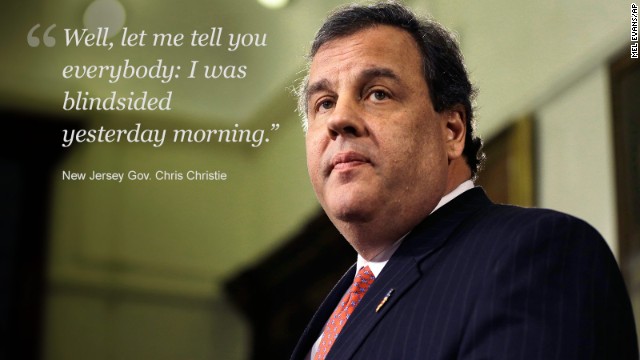 Quotes from Christie apology
Quotes from Christie apology 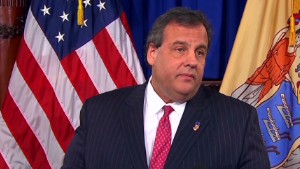 Can Christie survive the bridge scandal?
Can Christie survive the bridge scandal? The legislators charged him with contempt for his lack of cooperation. But the dam could eventually break as lawmakers dig in their heels, analysts say.
As long as Christie was telling the truth at a marathon press conference he held on Thursday, he should be able to step out of the caldron, analysts who spoke with CNN say.
For nearly two hours the high-profile governor, who gained national recognition for his response to superstorm Sandy, answered questions from journalists, divulging many details.
"He was pretty specific about what he knew and when he knew it," said CNN analyst Gloria Borger on The Lead with Jake Tapper.
But if any of it doesn't jibe with other peoples' stories, information provided in documents or clues that pop up, experts say Christie could get dragged into civil and criminal lawsuits.
One thing is certain. The legislative inquiry into the alleged misdeeds that led to the traffic jam on the George Washington Bridge is just getting into gear.
What happened to begin with?
It was September and Christie was full steam into his re-election bid -- which he won two months later. Wildstein, who Christie appointed to a high position at the Port Authority of New York and New Jersey, ordered the closing of two of the three lanes of traffic leading to the George Washington Bridge in Fort Lee. It held up motorists trying to make it into Manhattan and caused days of massive traffic jams in Fort Lee, where the Democratic mayor Mark Sokolich had declined to endorse Christie for re-election.
Democrats speculated that the mayhem was political retaliation against Sokolich. Hearings ensued, and Wildstein resigned under pressure. Then came Wednesday's revelation that a top Christie aide, Bridget Anne Kelly had e-mailed Wildstein before the closures, telling him, "Time for some traffic problems in Fort Lee." "Got it," Wildstein replied back. He e-mailed a comment that the parents of children stuck in school buses in the traffic jams were Democratic voters.
Christie fired Kelly after the scandal broke.
Possible prank, sure, but something to sue over?
This was no fun and games for people who sat tormented for hours in traffic and missed important appointments, legal analyst Alan Dershowitz told CNN's Brooke Baldwin.
It did real damage.
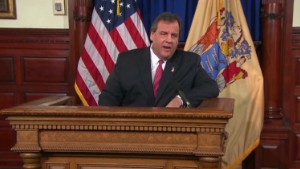 What did Christie's press conf. accomplish?
What did Christie's press conf. accomplish? "It was utter chaos those days. People were pouring into the store, complaining," Debbie Minuto recalled Thursday in her shop, Binghamton Bagel Cafe, in the town of Fort Lee. "The bridge is a lifeline here. You take away the bridge, you take away our livelihood."
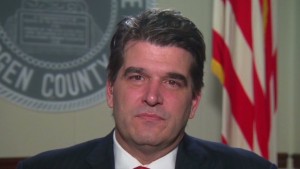 Fort Lee Mayor on Christie's apology
Fort Lee Mayor on Christie's apology 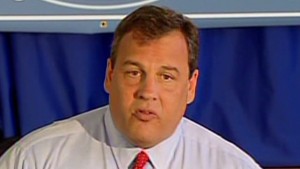 Gov. Chris Christie's style: A bully?
Gov. Chris Christie's style: A bully?  Can Christie survive the bridge scandal?
Can Christie survive the bridge scandal? That makes it a legal matter, Dershowitz said.
"The law looks backwards and says: What causes these harms?" he said.
One group of residents from Bergen County, where Fort Lee is located, has already filed a class-action civil lawsuit against Christie. They want to be compensated for alleged wages lost, when they arrived late at work.
Was a crime committed?
A woman died at the time of the mayhem, and emergency workers trying to get to her to save her complained that the traffic jams slowed them down.
Sokolich thinks there should be a criminal investigation into the incident, saying it put "folks in absolute danger."
His Democratic colleague, New Jersey state Sen. Ray Lesniak, agrees but takes it a step further. He called for federal prosecutors to open an investigation into whether the lane closures were a factor in the woman's death.
"Endangering people's lives -- that's not politics. That's why the U.S. attorneys have to get involved," he said.
U.S. Attorney's Office spokeswoman Rebekah Carmichael, said it's "reviewing" whether federal laws were violated.
But Florence Genova's family doesn't seem to want to press charges.
She was 91 when she went into cardiac arrest, and her daughter Vilma Oleri told CNN affiliate WABC that she didn't the traffic was to blame.
"I really don't think so, no, I really don't. I think she was 91 and really believe in my heart that she was already gone when the ambulance got (to her house)," she said.
But Genova was not alone. Paramedics red-flagged "unnecessary delays for emergency services" to the mayor on the second day of the lane closures.
Legal analyst Dershowitz thinks a crime may have indeed been committed and prosecutors could land convictions against Wildstein, Kelly and anyone else implicated, "particularly if they can demonstrate if the woman died as a result of the traffic jam."
Christie says he didn't know anything about this. How could this get him?
If Christie's close associates are prosecuted or convicted, it could lead them to turn on Christie, Dershowitz said.
Thursday's press conference was the longest and most candid in Christie's career, New Jersey public radio reporter told Jake Tapper.
"This is absolutely extraordinary," he said. Christie offered a lot of information to back up his claim that he knew nothing.
At the same time, he may have given investigators fodder to work with, but also a lot for Wildstein and Kelly to contradict, should they open up to lawmakers who questioning them.
"They may very well want to save themselves and say, 'Wait a minute; don't believe what the governor said,'" Dershowitz told Baldwin.
Wildstein may have pleaded the Fifth initially, but that's normal in the beginning, Jeffrey Toobin told CNN's Wolf Blitzer.
"You don't want your client testifying until he has seen all the documents available."
But things could change. If lawmakers decide to go after Christie, they could offer Wildstein -- or Kelly, if they question her -- immunity.
They could decide to save themselves at his expense, Toobin said.
Anyone Christie fired may also try to get revenge.







